When you decide to study for a career in Criminal Justice, you are forging your own path to make a difference. Whether you want to chase the bad guys, put them in prison, or work at an office solving diverse Criminal Justice dilemmas, a degree in Criminal Justice lets you acquire the necessary skills to navigate crime-solving technology advancements and complex judicial laws.
Criminal Justice is a social science involving agencies that identify and seek to control criminal behavior and patterns and impose penalties on criminal acts. There are three levels of the Criminal Justice system in the United States at the federal, state, and local levels working together toward the same goal.
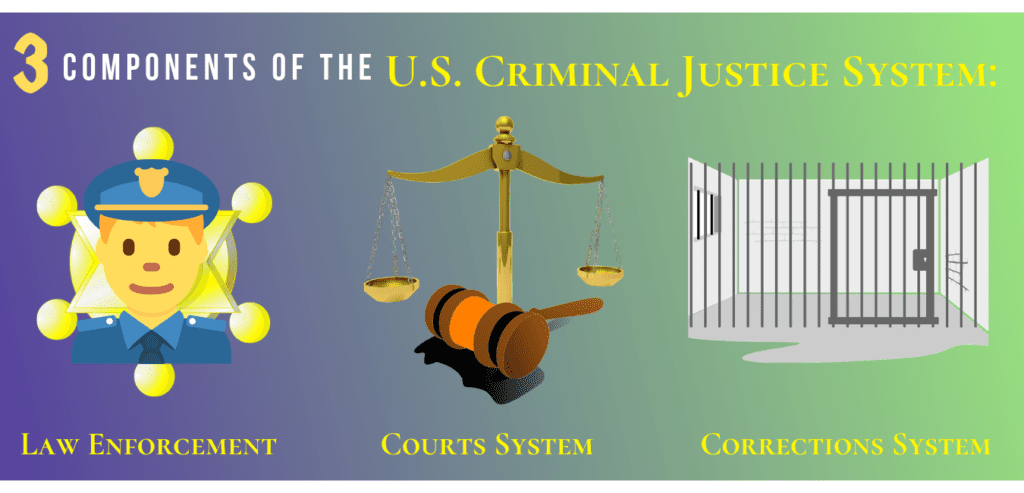
Students of any Criminal Justice program must gain knowledge and understanding of the three components of the Criminal Justice system:
Law Enforcement: This is all about enforcing and full compliance with the law ensured by law enforcement agencies, police officers, and detectives.
Courts System: This consists of the members of and workers within the legal system like lawyers, judges, juries and other court staff. These people ensure that a fair trial is executed according to the rule of law.
Corrections System: This is comprised of the people who supervise convicted criminals or offenders. Probation and correctional officers come up with reports to help the judges or courts decide.
JUMP TO:
Types of Criminal Justice Degrees
Criminal Justice Degree Specializations
Online vs. Brick and Mortar Criminal Justice Degrees
Criminal Justice Career Pathways, Information, and Outlook
Criminal Justice Schools, Degrees, and Rankings
Criminal Justice as a Degree

According to the Bureau of Labor and Statistics, most federal agencies and police departments look for applicants who have attended some college coursework or a 2 to a 4-year college degree.
Criminal Justice is a challenging field with many areas of study. Criminal Justice professionals often continue their education through attending degree programs like law, masters of public administration, or even information technology fields.
Types of Criminal Justice Degrees

An Undergraduate Certificate in Criminal Justice is the basic educational attainment in the Criminal Justice field. This can be earned after completing 15 credit hours with a curriculum focusing on one topic area– Advanced Crime Analysis, Criminal Behavior, Leadership in Criminal Justice, Law and the Courts, Corrections or Victim Advocacy. Several well-known colleges and universities offer certificate programs in Criminal Justice through both traditional classes and non-traditional classes.
FAQ: What kind of career can I have with an online Bachelor’s degree in Criminal Justice?

An Associate in Criminal Justice may be earned in two years with full-time study with 60 credits of the program to complete. Core courses include Introduction to Criminal Justice, Juvenile Justice Systems and Processes, Ethics and the Criminal Justice, and Criminal Law. An associate’s degree is a good step towards earning a bachelor’s degree in Criminal Justice and is available through an on-campus and online format.
A Bachelor’s in Criminal Justice requires 120 credit hours for students to complete. The bachelor’s degree program consists of a wide variety of subjects. Its curriculum typically has core courses in Introduction to Major Problems in Criminal Justice, Criminal Responsibility, Understanding Criminal Behavior, Introduction to Criminal Justice, and Criminal Investigation. Some research focus courses may cover Special Topics in Criminal Justice Research, Death Penalty: Law and Policy, Investigating Cybercrime, and Rights of the Accused. The senior thesis may also be required. Students may earn either a Bachelor of Science or Bachelor of Arts degree.
A Master’s in Criminal Justice may be completed in two to three years with 36 to 40 credit hours required through either Master of Science or Master of Arts degree. Foundation courses of a master’s degree in Criminal Justice may include Contemporary Issues in Criminal Justice Policy, Administration of Justice, Criminal Behavior and the Family, Youth Justice and Crime and a Criminal Justice Capstone. The degree program may also require three credit hours of a wide range of electives like Human Trafficking and Exploitation, Policing Issues around the Globe, Domestic and International Terrorism, Genocide and War Crimes and more. Graduates of this degree may take the path to become Criminal Justice instructors.
A Ph.D. in Criminal Justice provides students the expertise in the general field of Criminal Justice needed in the research or allows the graduates to direct research and teach at a post-secondary institution. Students may take core courses like Theories of Crime, Theoretical Foundations of Criminal Justice, Research/Analytical Writing, and more. Competence in comprehensive examinations, research methodology, and quantitative techniques are expected to earn the doctorate.
Criminal Justice Degree Specializations
Criminal Justice students can opt to specialize in a variety of sub-fields. Studies of focus include:

Sociology provides students the knowledge about human behavior and the structure of groups, organizations, and societies. It also studies the relationship between cultures and what unites them. Community life, life patterns, family, relationships, social class, gender, race, the environment, and technology are some of the subjects covered.
Forensic Science helps you process a crime scene especially in collection, preservation, and analysis of evidence. This specialization also helps you learn forensic science, relevant medical history, traumatic injury, postmortem interval or lab tests. Psychological autopsies, hypnosis, and lie detection, and death-science investigation are also part of Forensic Science.

Homeland Security provides courses that help students learn how to demonstrate knowledge of homeland security and crisis management. Risk analysis and strategic communication for homeland security and crisis management, concepts of ethics and diversity relating to homeland security and crisis management, technology and critical infrastructure protection are some of the subjects provided.
FAQ: Does an online Bachelor’s degree in Criminal Justice prepare me for a career in Homeland Security?
Law Enforcement emphasizes the role of the police, the concepts of justice and societal issues, and the community support systems. Legal Issues, Miranda Rights, & Search Warrants, Handling Domestic Violence Cases, White Collar Crimes, and Ethical Considerations in Law Enforcement are some of the courses covered in this specialization.
Cybersecurity is also called an information security degree. This concentration provides students a curriculum in Applied Digital Forensic Investigation, IT Security Policies and Procedures, and Digital Forensics and Investigations. These courses help students learn how to assist individuals or businesses in protecting sensitive information, engaging in forensic analysis relevant to cyber incidents, and securing computer networks.

Criminal Scene Investigations focuses on evidence handling, interrogation and law enforcement techniques. Courses in this specialization help students learn forensics, crime scene photography, and management. The Criminal Mind, Professional Responsibility, and Ethics in Investigations, Crime Scenes and Investigating Crimes Against Property and the Private Sector are some of the classes in the coursework.
Corrections helps students learn diagnostic techniques, history, and philosophy of adult and juvenile correctional systems and facilities. Coursework may include Issues in Corrections, Juvenile Justice & Delinquency Theory, Professional Report Writing & Presentations, and Crisis Intervention and Communication in Corrections. Also, it may cover topics in organizational behavior, budgeting for law enforcement and employment & policy law for law enforcement.

Juvenile Justice allows students to learn about the differences between juvenile and adult justice systems. This specialization is perfect for students who want to make an influence on the lives of juvenile delinquents. Courses may include International Responses to Juvenile and Adult Offenders, Cooperative Study in Justice Policy Leadership, Corrections and Juvenile Justice Interventions and Mental Health/Substance Abuse Issues in the Correctional Setting.
Criminal Psychology lets students learn the strategies in conducting evaluations of the accused or alleged victims. This specialization applies psychological principles to the Criminal Justice system. Course options may cover Adult Psychopathology and Treatment, Biological Bases of Behavior, Drugs, Addiction and Crime, Psychotherapy, and Types and Characteristics of Crime.

Legal Studies provides an opportunity for students to gain an understanding of the fundamental principles of law. This includes business law, real estate law, patent and copyright, online fraud and environmental law. Students will also have to learn the branches of government and work on courses like introduction to legal studies, legal research and writing, legal ethics, family law, and global politics.
Difference Between Criminal Justice and Criminology
Both fields of Criminal Justice and criminology have common topics such as crimes, location, and timing of crimes. What sets them apart is that criminology, in its purest form, is an interdisciplinary field of sociology, which means it is the study of crime. On the other hand, Criminal Justice is the system in which crimes and criminals are identified, tried and punished.
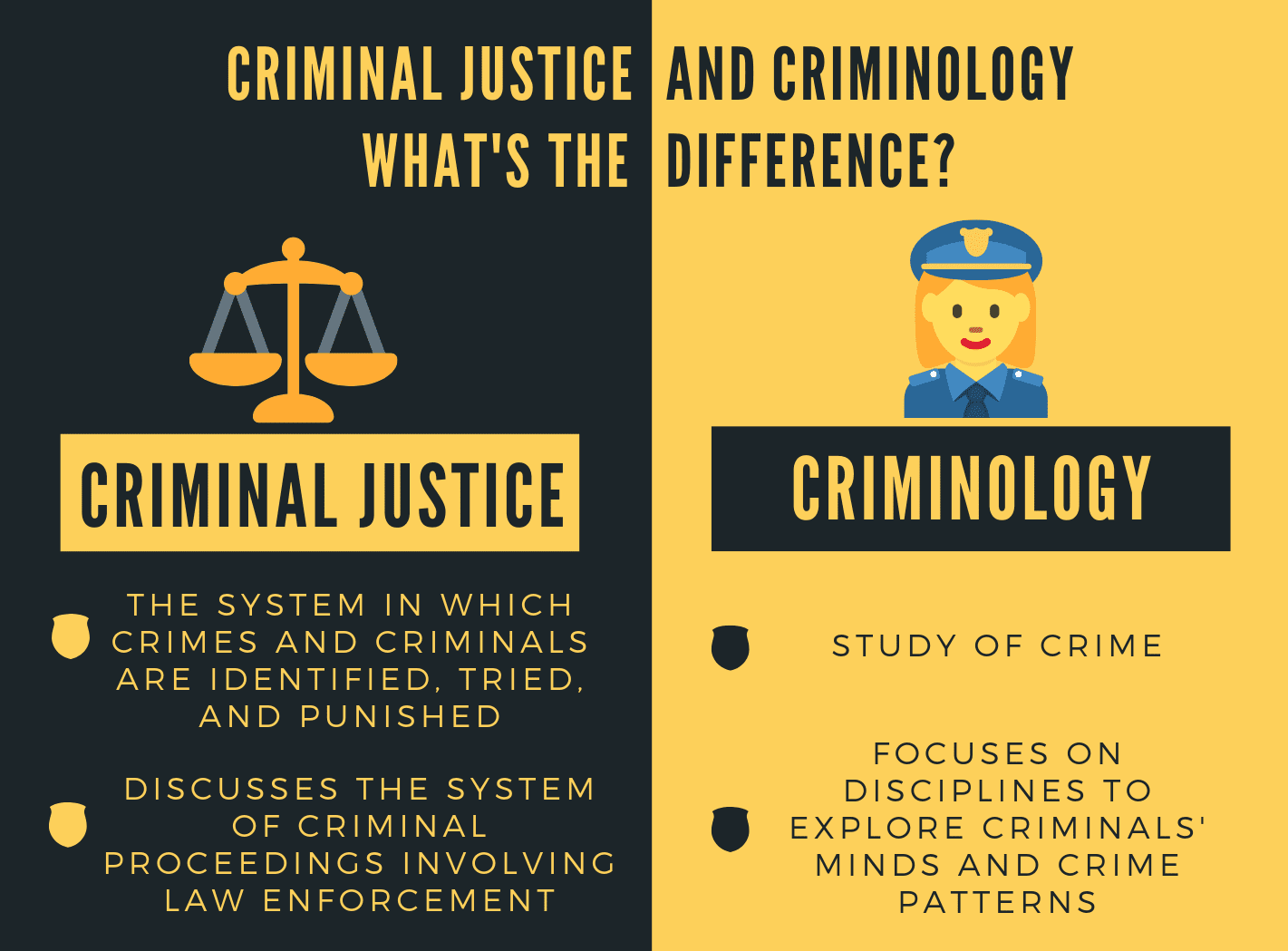
Criminology also studies the causes, cost, and consequences of crime and includes biology, anthropology, psychology, law and various other fields focusing on criminals’ minds. This is to learn what and why crimes are committed, and these studies give ideas and exposure to how these crimes may be prevented. Criminal Justice discusses the system of criminal proceedings involving law enforcement or the police and lawyers, courts and corrections. It deals with what should be done after a crime happens.
Online vs. Brick and Mortar Criminal Justice Degrees

Earning a degree in Criminal Justice is now possible through both on-campus and online format. Nowadays, nontraditional programs are offered with the same admission and curriculum requirements as the brick and mortar programs. Students of online classes enjoy the flexibility of attending classes wherever they are located. They are provided with online courses, written or video lectures, readings and assignment. They are also expected to take tests through discussion boards. Accredited online colleges allow adult students to get the same quality education with brick and mortar programs. Many of these colleges provide full access to the school’s library, and social interaction is possible through conferences and technology support.
Criminal Justice Career Pathways, Information, and Outlook
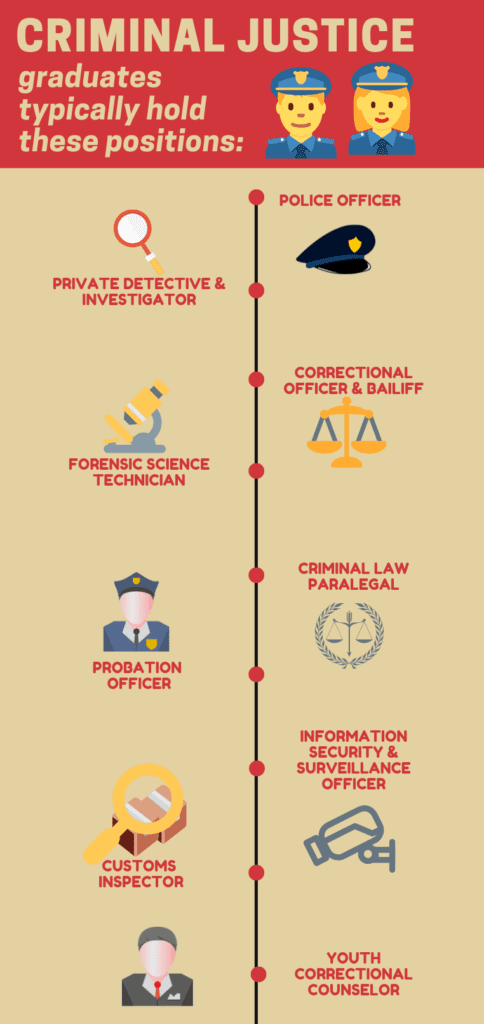
Criminal Justice is a field which offers a great variety of job options. Graduates of the Criminal Justice program do a wide range of services for the public both early in their careers and for long-term professional stretch. Federal, state, and local government agencies and private organizations provide several lucrative jobs that await Criminal Justice degree holders.
FAQ: What are the advantages and disadvantages of a career in Criminal Justice?
The different branches of Criminal Justice offer a wide array of career opportunities like the following:

Police Officers maintain public peace and order, defend people and property, apprehend individuals who commit crimes and report crimes or suspicious activities. The Bureau of Labor and Statistics reports a favorable employment forecast for police officer careers which is likely to rise 7% within the next seven years. This is just about as fast as the average for all occupations. The median annual wage is $62,960.
Private Detective and Investigators gather facts, collect criminal evidence, verify statements, investigate crimes, and search for missing persons. They can also be court witnesses, participate in raids, investigate and psychoanalyze suspects. They have to be mindful of the law when studying as they lack police authority. The employment growth rate is at 11% which is faster than the average for all occupations, and the median annual salary is $50,700.
Correctional Officers and Bailiffs keep the order and safety of a prison facility or detention center. They also enforce rules within the jail or prisons, inspect facilities and inmates for contraband items. Bailiffs are sworn law enforcement officer who keeps courtrooms safe and in order. They escort and ensure the security of judges, prisoners, witnesses, and jurors. The median annual wage is $43,540.
Forensic Science Technicians collect shreds of evidence from the crime scene and analyzing them in laboratories. They perform scientific (chemical, biological, and microscopic) analyses from the crime scene. Research says employment of forensic science technicians is expected to be up 17% until the next seven years. The median annual wage is $57,850.

Criminal Law Paralegals assist lawyers by conducting research, organizing files, gather legal documents, summarize written reports, handling exhibits, calling clients and other lawyers for meetings and interviews. The job outlook for a paralegal is expected to grow 15% from the present to 2026 and the median annual wage sits at $50,410.
FAQ: What kind of salary can I expect to earn with an online Bachelor’s degree in Criminal Justice?
Probation Officers act as counselors for individuals who are on community service or drug rehabilitation. They do interviews, evaluate and provide probationers and parolees with resources. They write reports and case files for the individuals and may testify in court. Employment for probation officers is expected to grow by 6% within the next years. The median annual wage is $51,410.
Information Security Officers and Surveillance Officers prevent theft and maintain security systems in establishments, respectively. The projected growth rate for information security and surveillance officers are expected to be 6% for the next seven years. The median annual wage is $33,260.
Customs Inspectors inspect and investigate persons, goods and merchandise, passenger bags and cargo. Typically, they work in airports, seaports rail stations, and border crossings. Their responsibility is to prevent smugglers from bringing illegal goods, weapons or drugs into an area or country. They also ensure that shipment and other cargo do not violate laws.

Youth Correctional Counselors are employed by either the state or national government to rehabilitate and guide juvenile offenders to become productive citizens. Their job involves meeting with school officials, parents and law enforcement officers. They mainly have to discuss personal matters, relationships and specific behavior with the juvenile offenders.
10 Most Common Criminal Justice Careers
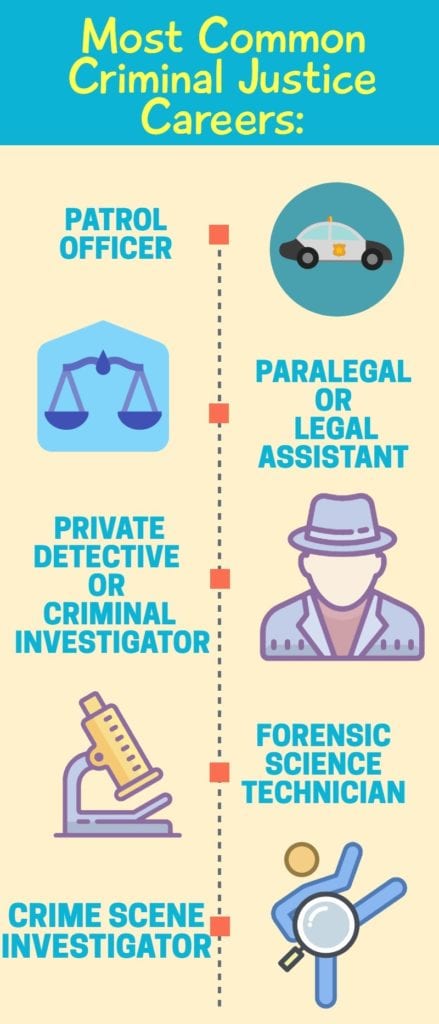
Sheriff
A sheriff may be referred to as a patrol officer, state trooper, or police. Patrol officers are responsible for issuing traffic citations, investigating minor crimes and traffic crashes, and assisting people while patrolling the streets and sidewalks of each community. The median annual salary for patrol officers as of 2010 is $58,000. A bachelor’s degree is needed to be able to earn a badge as a police officer. In some cases, certification and training are both required.
Paralegal or Legal Assistant
A paralegal or legal assistant works in collaboration with attorneys and assist them in preparing legal documents and court trials. They are typically restricted from arguing cases in courtrooms or practicing law on their own. The median annual salary for a paralegal is $53,000. An associate or bachelor’s degree is needed at the very least to be able to pursue this career effectively.
Private Investigator or Criminal Investigator
Private investigators specialize more on burglary, a person’s crime against people such as robbery, battery, and domestic violence, or homicide. They handle detailed investigations and interviews. The median annual salary for a private detective is at most P80,000. A bachelor’s degree is at least needed to be able to pursue this career effectively.
Forensic Science Technician

A forensic science technician works in government agencies, laboratories, hospitals, courtrooms, and other areas where the reconstruction of events is based on clues like hair samples, broken material, and fingerprints. Forensic science technicians have a median annual salary of $61,220, yet average wage is higher in states with an increasing demand for them such as California, Nevada, and Illinois, where the average salary lies between $76,160 and $82,650. Training for this career happens as early as high school, being entirely focused on science and math curricula. A high school diploma is needed at the very least to pursue this degree effectively.
Court Clerk
A court clerk provides clerical support in court systems, municipalities, and federal license agencies, and bureaus. They handle numerous administrative tasks like researching and obtaining information for judges, preparation of court case dockets, maintenance of financial records and fiscal accounts, collecting fees, issuing licenses and permits, and drafting bylaws for town or city councils. Court clerks need to complete at least an associate degree to be eligible for employment. The median annual salary of a court clerk is $38,230 yearly.
Correctional Officer
A correctional officer works typically in prisons and jails for the supervision and assistance of those convicted of crimes. They are needed as well in the state, local, and federal levels since every judicial body has separate incarceration systems. The median annual salary is $43,510 yearly. A certification and bachelor’s degree is needed at the very least to pursue this career.
Conservation Officer
Conservation officers monitor hunters, fishers, and trappers to guarantee that they comply with state and federal regulations. They deal with the inspection of licenses, bag (tag) limits, specimens collected, and equipment used. They also handle educational programs for wildlife preservations, the enforcement of state and federal policies in parks and campgrounds, and establishment and protection of a chain of custody of evidence gathered during investigations on fish and wildlife policy violations. A high school diploma serves as the minimum requirement to enter this career. The median annual salary for conservation officers is $49,400.
Immigration and Customs Enforcement Agent
As an immigration and customs enforcement agent, you are expected to investigate, arrest, and deport those who should not be in the United States. They must also be aware of present policies and regulations, recommend presentations to courts hearing immigration cases, and participate in covert assignments. Salary is generally based on experience, but applicants holding a degree in criminal justice can earn higher wages upon entering this career. The median annual pay of an immigration and customs enforcement agent is $79,970. A bachelor’s degree is needed at the very least to enter this career.
US Postal Inspector
Postal inspectors handle the investigation and resolution of crimes related to the U.S. mail. These crimes involve theft, vandalism, fraud, and identity theft. They utilize forensic strategies, question witnesses, and research results in the solving of crimes. Applicants should, at the minimum, hold a bachelor’s degree from an accredited academic institution. The median annual salary for postal inspectors ranges from $35,000 to $55,000.
Secret Service Agent

A secret service agent handles the protection of the integrity of the country’s financial systems in terms of evading and eliminating cyber attacks on banking systems, identification and removal of counterfeit currency from circulation, and the investigation, arrest, as well as prosecution of criminals who have broken laws intended in protecting the nation’s financial security. The median annual salary of a secret service agent is $43,075. A bachelor’s degree is needed to pursue this career.
30 Highest Paying Criminal Justice Careers
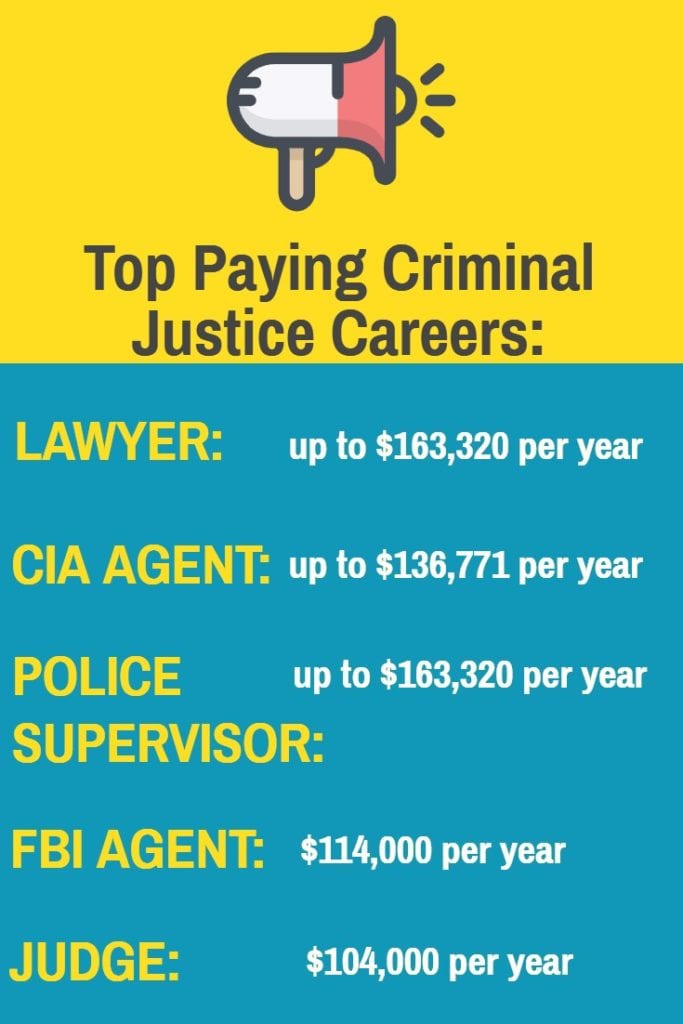
State Trooper
State troopers work in state highways to uphold all vehicle laws such as seatbelt use and speeding. They also enforce lesser known laws in regulating commercial vehicle or semi-truck features and usage. State troopers also assist law enforcement agencies in apprehending criminals, detecting illegal activity, and fighting back against terrorism. A high school diploma is considered the minimum requirement to enter this career.
State Trooper Salary: $62,960
Lawyer
A lawyer or attorney represents individuals or groups in civil or criminal trials who advise clients in terms of their legal obligations and rights. Lawyers are advocates who offer clients with personal or business courses of action according to their knowledge of laws and research. A doctorate, which includes three years of law school with bar examinations and licensing programs for employment, are required to be a lawyer. Lawyers may also take a specialization in bankruptcy, international, intellectual property, criminal law, civil law, public interest, insurance, environmental, elder, or probate laws.
Lawyer Salary: $ 74,980 to $163,320 yearly
Private Investigator or Detective
A private investigator or detective gives effective law enforcement strategies for the maintenance of laws, gathering of evidence, apprehension of criminals, resolution of crimes, and examination of records for the assistance of arrests or raids. Detectives are considered unlicensed or licensed, depending on the organization of employment. Private investigators and detectives work at police agencies, interagency task forces, private firms, and often specialize in disciplines such as homicide, forensics, fraud, or SWAT teams.
Private Investigator/Detective Salary: $59,320 to $92,700 yearly
Police Officer
A police officer is responsible for the maintenance of public order, collection of evidence, pursuit and apprehending of individuals who have committed crimes, testifying in court, prevention, investigation, and reporting of suspicious activities. Police officers assist people who need aid, make arrests, and detain individuals. Certain agencies prefer associate or bachelor’s degree holders in the administration of justice or law enforcement.
Police Officer Salary: $38,850 to $64,940 yearly
U.S. Federal Marshal
A U.S. federal marshal is considered to be a significant member of the executive branch of the U.S. government. Federal marshals secure or guard federal courts, protect court officers and structures, and guarantee the efficient operation of the judicial system through security maintenance, service to arrest warrants, transport of prisoners, and knowledge on the location of fugitives. Federal marshals are required to earn a bachelor’s degree in criminal justice, gain three years of work experience, possess a good background, and be successful in the completion of physical, written, and psychological evaluations to be admitted into the U.S. Marshals Service Training Academy in Glynco, Georgia.
Federal Marshal Salary: $38,511 to $48,708 yearly
Forensics Analyst
A forensic analyst is one of the significant workers within the criminal justice system responsible for the collection, classification, analysis, and identification of physical evidence related to law enforcement investigations. Forensic analysts may work in the city, county, state crime laboratories, offices, morgues, at crime scenes and may collaborate with medical examiners, police departments, toxicology lab technicians, hospital staff, and researchers at academic institutions. Specializations include ballistics, handwriting, fingerprinting, and biochemistry and they often testify in court as expert witnesses who report laboratory findings. Forensic analysts should complete a bachelor’s program in criminal justice with a forensic science specialization, but several law enforcement agencies prefer applicants with a master’s degree educational background.
Forensic Analyst Salary: $37,520 to $58,510 yearly
Paralegal
A paralegal works in law firms, law offices, organizations, corporations, license service companies, bankruptcy firms, arbitration services, public notaries, and they may work as independent consultants handling several tasks. Paralegals are responsible for researching, analyzing, organizing, and gathering information used for hearings, trials, meetings, and some proceedings. They may also prepare tax returns, plan estates, and create trust funds for clients. They also coordinate with regards to the schedules of other law office staff and maintain financial records for their respective organizations of employment. To be a paralegal, one must obtain at least an associate degree.
Paralegal Salary: $36,080 to $58,540 annually
Probation Officer

A probation officer is responsible for the supervision, rehabilitation, and reform of offenders who have been convicted of crimes, and are on probation, awaiting sentencing, and are not jailed. They also handle the assistance of offenders released from incarceration and overseeing activities after imprisonment. They also handle the investigation of offenders’ background, history, and environment. They also report results to court officials for the recommendation of social resources and rehabilitation aid, formulate recommendations and review sentences, aid in changes of court orders, and make references for offenders to casework counseling, career training, or community service programs. The minimum educational degree requirement for this career is a bachelor’s.
Probation Officer Salary: $35,990 to $60,430 yearly
Corrections Officer
A corrections officer monitors incarcerated individuals within prisons and other detention centers to maintain security, uphold institutional regulations and policies, minimize disturbances, prevent escapes, and control prison populations. They also handle the transportation of inmates, completion of reports on inmate behavior, and activities and inspection of facilities regarding infractions, hazard regulations, safety, and sanitation. They usually work in jails and prisons, monitoring officers who do the daily tasks of the facility. They work in ensuring the safety of employees of the prison and inmates. A bachelor’s degree is the minimum degree needed to enter this particular career.
Corrections Officer Salary: $29,660 to $51,000 yearly
Immigration and Customs Enforcement Agent
An immigration and customs enforcement agent is responsible for the prevention of illegal immigration and prevention of the unlawful traffic of goods into the country. With a significant focus on ensuring the security of the nation’s borders, US Immigration, and Customs Enforcement has been continually increasing, as well as other federal law enforcement agencies. These agents may look for employment opportunities with federal government organizations such as the Department of Homeland Security, Secret Service, Immigration and Customs Employment, Customs, and Border Control, the Coast Guard, the Federal Protective Service, the Federal Law Enforcement Training Center, and the Transportation Security Administration.
Immigration and Customs Enforcement Agent: 79,970
Fire Investigator
A fire investigator eliminates fires during the occurrence and secure people’s lives during fires. They also investigate a fire incident and check its causes. Fire incidents are resolved through a detailed and careful investigation.
Fire Investigator Salary: $56,000
Homicide Detective

A homicide detective handles the investigation of deaths suspected as a result of criminal activities, including deaths with unknown causes, to eliminate illegal action. Homicide detectives are considered sworn law enforcement officers. They are lifted from their former position as a police officer or another position involving law enforcement. They usually work for local, state, or federal law enforcement offices. This job requires at least a high school diploma to enter this career.
Homicide Detective Salary: $79,620
Security Manager
A security manager oversees the day-to0day security of private property or building. They work for security companies by managing big networks of security systems and features. Private security managers work in malls and large corporations with safety personnel.
Security Manager Salary: $88,881
College Professor
Typically, a college professor teaches specific courses in universities and colleges. College professors who need a criminal justice degree are those who teach criminal justice as a course. There are no other requirements needed to pass. They are also not required to have an advanced doctoral degree. To teach in a college or university, they need to acquire a master’s degree.
College Professor Salary: $72,000
Financial Examiner
A financial examiner is responsible for auditing the finances of different entities, from individuals to corporations. They are highly competent in financial mathematics and policy strategies for the identification of signs of financial fraud. They may collaborate with law enforcement for the investigation of specific entities. They may also work for a private firm that handles these forms of inquiry. If a corporation is involved in issues such as money laundering, embezzlement, or financial fraud, a financial examiner shall examine such concerns.
Financial Examiner Salary: $79,000
Intelligence Analyst
An intelligence analyst mostly focuses on desk jobs. They are crucial to statisticians, as they help them gather and analyze information to know about the existence of potential security risks and the various techniques that are most effective for resolution. Most intelligence analysts collaborate with the FBI since they also handle the preparation of reports.
Intelligence Analyst Salary: $83,000
Forensic Psychologist
A forensic psychologist is a criminal justice specialist and semi-clinical psychologist. They must determine based on their knowledge of human behavior, what type of person a suspect is for a particular crime. Typically, forensic psychologists work in specialized areas of witness, victim, and prisoner counseling. Forensic psychologists also specialize in one aspect of the system and achieve advanced degrees for ease of performance. A master’s degree is considered to be the minimum requirement to enter this career.
Forensic Psychologist Salary: $84,000
FBI Agent
An FBI agent is involved in high-risk investigative jobs. FBI Agents are required to have law enforcement experience, criminal justice experience, and the capacity to pass all background checks and physical exams. Earn a bachelor’s degree as it is the minimum requirement to pursue this career.
FBI Agent Salary: $114,000
Judge
A judge supervises trials and ensures that the lawyers involved coincide with the due process and carefully follow the strict policies in the field. They generate several decisions in the courtroom, like the verdicts of many cases. They permit warrants and reiterate what can be allowed as evidence in a specific trial. Most judges were attorneys before they became judges. A master’s degree is the minimum requirement for this career.
Judge Salary: $104,000
Fish and Game Warden

A fish and game warden is considered a conservation officer. Their main concentration is the enforcement of laws related to conservation and environmental protection. Fish and game wardens have carried numerous functions of marine patrol officers and wildlife officers. They work with hunters, boaters, fishermen, and outdoor enthusiasts, and they also ensure that wildlife and woodlands are safe for everyone to enjoy.
Fish and Game Warden Salary: $58,570
Forensic Accountant
A forensic accountant is a financial specialist who is keen when it comes to details. They handle the investigation of financial crimes like tax evasion, money laundering, embezzlement, and fraud. Forensic accountants are considered certified public accountants who provide their services for law enforcement. They work in federal law enforcement agencies or private investigative firms, give information and counsel to courts for criminal investigations and financial analysis for civil damages and liability cases.
Forensic Accountant Salary: $65,000 yearly
CIA Agent
A special agent for the Central Intelligence Agency or CIA aids the federal government in the investigation of law violations worldwide. They collaborate with other law enforcement agencies regularly through a blend of special skills obtained through training. A bachelor’s degree is required in the fields of forensics, language, criminal justice, and law. They may require at least five years of experience in investigation.
CIA Agent Salary: $74,872 to $136,771 yearly
Bailiff
A bailiff is customarily employed in the state, local, and federal courtrooms. They are responsible for the announcement of a judge’s entrance into court, assistance in the transport of defendants to and from the court, delivery of documents in court, enforcement of courtroom decorum and judges’ directions, and interaction with defendants. You need a high school diploma to be qualified for the position.
Bailiff Salary: $74,060
Sociologist
A sociologist studies social behaviors and examines groups to know their way of interaction. This may include original research, data analysis, report preparation, and counseling of policymakers. A master’s degree in sociology is needed aside from a bachelor’s or master’s degree in criminal justice.
Sociologist Salary: $79,650
Clinical Social Worker
A clinical social worker handles the diagnosis and treatment of mental and behavioral disorders. They usually work in health clinics, welfare offices, and community-development centers. They must also obtain a license in the state where they practice. A master’s degree is considered to be the minimum requirement to enter this career.
Clinical Social Worker Salary: $79,749
Mental Health Counselor
A mental health counselor aids people who are suffering from substance abuse, behavioral disorders, and mental health concerns. They handle the assessment of psychological and physical health, development of treatment plans, and collaboration with clients for the identification of behavior which may harm the client’s quality of life.
Mental Health Counselor Salary: $70,840
Information Security Analyst
An information security analyst requires specialized training focused more on significant information, computers, and cybersecurity. They handle the safety of individuals, companies, and firms through practical details. A doctorate is required to be able to enter this career.
Information Security Salary: $95,510
Police Supervisor

A police supervisor or sergeant handles the overall efficiency of a police department. They are responsible for ensuring that there are order and development in their department through training and efficient employment of human resources, mitigation, and resolution of internal conflict, planning for future departmental needs, and upholding of standards in their respective jurisdiction.
Police Supervisor: $134,810 annually
Fraud Investigator
A fraud investigator determines whether claims are valid or not, generally after an insurance company or other group has paid for an application. This may involve allegations of property damage, personal injury, or any fraud like corporate financial crimes. They are responsible for gathering pertinent evidence, interviewing the parties involved, and presenting the results to the client who hired them.
Fraud Investigator: $64,690
Federal Special Agent
Special agents most often work for investigative agencies and include jobs such as FBI agents, NCIS agents, DEA agents, ICE agents, and Secret Service agents. Although some agents may work for state agencies, special agent jobs are typically found in federal law enforcement careers. Agents are specially-trained investigators and specialize in the detection and investigation of a variety of crimes.
Federal Special Agent Salary: $131,500
Unique Criminal Justice Careers

Blood-Splatter Analyst
Blood-splatter analysts are classified as crime scene investigators. They are responsible for visiting crime scenes to track down blood samples and analyze blood patterns to give insight regarding a crime. Through the keen analysis of clues like the location, size, and shape of blood drops, stains, pools and puddles, the analyst can determine the location from which the victim and suspect moved within a crime scene. They identify the trajectory of a projectile and the possible sequence of events in a crime scene. A high school diploma, associate, or bachelor’s degree may be needed to be able to enter this career.
Victim Advocate
A victims advocate regularly works in district attorney’s offices, hospitals, jails, or in non-profit organizations aiding clients experiencing trauma as a result of domestic abuse, violence, rape, and other crimes. They help clients in the recovery and legal process, giving them access resources, providing support, and lessening the physical and emotional effects of the crime. They also accompany clients to court hearings and facilitate in securing court injunctions if needed. Victim advocates investigate complaints, provide administrative support along with statistical record maintenance, and provide means of enhancing client support services. Victim advocates should possess a bachelor’s degree with work experience or a master’s degree in psychology, social work, or criminal justice specializations. Victim advocates get an average of $31,616.
U.S. Postal Inspector
A postal inspector utilizes forensics and modern technology in the investigation of criminal, civil, and administrative violations of postal-related laws. Some tasks include working with other federal, state and local law enforcement agencies for the resolution of crimes like bank fraud, organized crime, identity theft, and mail bombs. Postal inspectors receive salaries through the Inspection Service Law Enforcement (ISLE) pay scale, which follows the General Schedule (GS) pay scale for law enforcement officers. A bachelor’s degree is the minimum requirement needed to enter this career.
Arson Investigator
An arson investigator is trained to determine the cause of a fire and whether there is criminal activity involved. They usually work in fire departments, law agencies, and the different levels of the court system. They complete additional training on fire investigation, research, analysis, the court system, criminal procedure, and others. They also specialize in larger metropolitan areas, as some arson investigators focus more on vehicular fires and storage of warehouse fires. A high school diploma serves as the minimum requirement to enter this career.
Crime Scene Fingerprint Analyst

A crime scene fingerprint analyst is an ideal career for those who are interested in criminal justice technology. They work in a laboratory or office. They usually use technology to assess, study, or preserve fingerprints as part of crime scene investigations. After obtaining a bachelor’s degree, additional training may be taken into consideration to be eligible for employment at the International Association of Identification and other forensic research groups. The median annual salary of a crime scene fingerprint analyst is $56,750 a year.
Park Ranger
Park rangers guard natural resources like national and state parks and forests. They design educational and safe programs to those who want to explore the wilderness. They handle natural and historical features, plan events, and keep visitors and the environment safe. They clear paths and warn visitors on environmental hazards for them to be able to enjoy the outdoors. Park Rangers’ annual salary is $60,610.
Correctional Treatment Specialist
A correctional treatment specialist is responsible for the development of rehabilitation plans for people released from jail, probationary sentence, or prison. The median annual salary for a correctional treatment specialist is $68,666. A bachelor’s degree is the minimum degree that is needed to pursue the career.
Computer Forensics Investigator

A computer forensics investigator gives numerous services as that of the digital collection information, investigation of computer systems, and data for the demonstration of present data for legal cases. They also determine how unauthorized users hack into a computer system. A bachelor’s degree can aid an individual in the development of skills needed for a successful career in this particular discipline. The median annual salary of a computer forensics investigator is $68,666.
Fish and Game Warden
Fish and game wardens regularly work in forest preserves, national parks, public waterways, and other protected recreational and conservation areas to guarantee habitat and wildlife protection. This job is best for individuals who enjoy an active lifestyle and the outdoors. Fish and game wardens are in demand in busy natural parks and communities like California and Texas. This career is a combination of biological and law enforcement knowledge, and taking certifications in forensic science and biology aside from criminal justice is helpful. The median annual salary is $58,570, and a high school diploma is considered as the minimum requirement to enter this career.
Travel Criminal Justice Careers

Criminal justice careers that involve international travel opportunities include the following:
Federal Air Marshal
Federal Air Marshals are considered armed federal law enforcement officers assigned on international passenger flights for the protection of the crew and passengers against criminal and terrorist acts. They are under the management of the Transportation Security Administration (TSA) and may also collaborate with the FBI Counterterrorism Task-Force and other Federal anti-terrorism activities. Air marshal careers typically vary from law enforcement jobs in terms of requirements, educational standards, salary, and benefits package. The median annual salary for a federal air marshal is $50,000. A bachelor’s degree is needed to be able to pursue this career effectively.
Diplomatic Security Special Agent
Diplomatic Security Special Agents are regarded as highly competent federal law enforcement officers. They are responsible for advising ambassadors on security matters and managing security programs for the protection of personnel, facilities, and information. In the U.S., they are competent for protecting the Secretary of State and visiting foreign dignitaries, in the investigation of passports and visa fraud, and handling of personnel security investigations. These agents may represent the country and are given opportunities to travel around the world to become knowledgeable regarding various cultures.
Border Patrol Agent

Border Patrol Agents are generally responsible for the prevention of terrorists and terrorist weapons from going through the United States. They also prevent undocumented aliens from entering the country and apprehend those who have violated immigration laws. They usually travel and patrol 6,000 miles off the Canadian and Mexican international borders and 2,000 miles off the coast surrounding Puerto Rico and the Florida Peninsula. The median annual salary for a border patrol agent is $45,371. A high school diploma or bachelor’s degree may be needed to become a border patrol agent.
Blood-Splatter Analyst
Blood-spatter analysts are responsible for taking photographs, interacting with biohazardous substances, writing reports, and they may also testify in court. Training for blood spatter analysts are often provided by the International Association of Bloodstain Pattern Analysts (IABPA), and you may also participate in courses locally or travel anywhere else in the world. The median annual salary for blood-spatter analysts is $56,320. A bachelor’s degree is needed at the very least to pursue this career effectively.
Transportation Security Screener
A transportation security screener stays on the front line for the safeguarding of American citizens through the airport, railroad, road, and maritime transportation security. They are in charge of protecting US transport systems from terrorist attacks and guaranteeing freedom of movement for commerce and individuals. They should be quick in counteracting security threats while interacting with the public in a friendly and helpful manner. They are also responsible for screening passengers, air marshals, the coordination of security, gathering of intelligence, and overseeing of the federal government’s transportation-related concerns during national emergencies. An associate or bachelor’s degree is required for this particular career. The median annual salary is $45,250.
DEA Agent
A Drug Enforcement Administration (DEA) special agent works for the world’s primary drug enforcement agency and investigates federal law violations involving controlled substances, illegal drugs, and drug abuse. They usually focus on the growth, manufacture, and distribution of drugs to organizations and people in the country or those who want to send drugs and other illegal chemical substances into the state. DEA Agents may block drug trafficking operations and disrupt the financial structures of the organization, and this is related to drug trafficking. A DEA agent’s job include is to impede drug traffic flow before it goes to the potential users. DEA agents may also do surveillance and undercover work, and most of their tasks involve high-risk situations in other countries as well. The median annual salary of a DEA agent is $58,130.
FBI Agent
FBI agents have numerous tasks because their primary responsibility is the enforcement of federal law since they work under the Federal Bureau of Investigation (FBI). Thus, several FBI agents are required to specialize in just one area of law enforcement once he or she graduates from new agent training. The training is extensively rigorous and covers case exercises, firearms training, training in academics, and operations. Once trained, FBI agents may travel to specific places for counterterrorism, cyber crime, civil rights violations, public corruption, organized crime, violent crime, or significant thefts, as it follows a particular step of an investigation through the criminal sentence. To be an FBI agent, applicants should take a bachelor’s or master’s degree in an accredited institution. The degree earned should coincide with the entry path, though it is also suggested that some critical skills be acquired to aid applicants in obtaining a position as a special agent.
Secret Service Agent
A secret service agent typically handles crimes like telecommunications and computer fraud as well as document forgery. Because of the nature of the work, the Secret Service requires that agents travel to other countries often, obtain a bachelor’s degree focusing more on the function of the Secret Service and have an excellent physical condition. Agents may earn a competitive salary of at least $49,746 and higher based on his or her qualifications.
CIA Agent
CIA agents are willing to put their lives at risk as part of their service to their department or community. They may be based on satellite offices abroad or within the country since they are often called for travel opportunities.
Criminal Justice Schools, Degrees, and Rankings

Need to know more about the Criminal Justice degree? Find more information here:
Best Online Schools for Associate in Criminal Degree Programs
Best Online Bachelor’s of Science in Criminal Justice Degree Programs
Top 20 Online Schools for Bachelor of Criminal Justice Degree Programs
Top Online Master’s of Criminal Justice Degree Programs for 2020